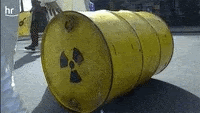Experts Say Nuclear Energy as Climate Solution Is Total 'Fiction'
As global scientists continue to warn of the urgent need to keep fossil fuels in the ground, a quartet of European and U.S. experts on Tuesday made a comprehensive case for why nuclear power should be not be considered a solution to the climate crisis.
While
the experts recognize in their joint statement that "the climate is
running hot," they push back forcefully against those who argue nuclear
could be a "partial response to the threat of global heating."
With
four signatories—Paul Dorfman, former secretary of the U.K. government's
Committee Examining Radiation Risks of Internal Emitters; Greg Jaczko, former
chairman of the U.S. Nuclear Regulatory Commission; Bernard Laponche, former
director general of France's energy management agency; and Wolfgang Renneberg,
former head of the reactor safety, radiation protection, and nuclear waste at
Germany's environmental ministry—the statement comes as a direct challenge to a
nuclear industry trying to bill itself as a reliable part of the world's
transition to a more sustainable energy system.
"As key experts who have worked on the frontline of the nuclear issue," their statement explains, "we consider it our collective responsibility to comment on the main issue: Whether nuclear could play a significant role as a strategy against climate change."
"The
central message, repeated again and again, that a new generation of nuclear
will be clean, safe, smart and cheap, is fiction," according to Dorfman,
Jaczko, Laponche, and Renneberg. "The reality is nuclear is neither clean,
safe, or smart; but a very complex technology with the potential to cause
significant harm."
"Nuclear
isn't cheap, but extremely costly," the statement adds. "Perhaps most
importantly nuclear is just not part of any feasible strategy that could
counter climate change. To make a relevant contribution to global power
generation, up to more than ten thousand new reactors would be required,
depending on reactor design."
Given
concerns about economic viability, nuclear accidents, and dangerous waste, the
former regulatory leaders conclude that nuclear energy is not only "too
costly and risky" but also "too unwieldy and complex" to be a
feasible strategy to combat the climate emergency.
Progressive
climate groups and other critics have long warned against nuclear energy, dubbing it
a "false solution" like gas and carbon capture technology, but
policymakers around the globe continue to pursue it. According to the
International Atomic Energy Agency, there are 439 operational nuclear
reactors worldwide and another 52 under
construction.
In
the United States, lawmakers who support climate action are divided on the
issue. When running for the Democratic presidential nomination in 2020, Sens.
Elizabeth Warren (D-Mass.) and Bernie Sanders (I-Vt.)—who now chairs the
Senate Budget Committee—advocated for
phasing out U.S. nuclear power.
A campaign spokesperson for Sanders told The Washington Post in 2019 that the senator "believes that solar, wind, geothermal power, and energy efficiency are proven and more cost-effective than nuclear—even without tax incentives—and that the toxic waste byproducts of nuclear plants are not worth the risks of the technology's benefit.
Especially in light of lessons
learned from Japan's Fukushima meltdown, we must ask why the federal government
invests billions into federal subsidies for the nuclear industry."
Despite
such risks, nuclear provisions are included in
the U.S. House-approved Build Back Better Act, a sweeping package that is
backed by President Joe Biden but has stalled in the Senate due to a pair of
corporate-backed right-wing Democrats.
Last
year, hundreds of progressive groups urged top
Democrats working on the package to "reject gas and other false climate
solutions" such as nuclear power, asserting that "as we look to
combat the climate emergency, it is crucial that we invest in solutions that
support a just energy future."
